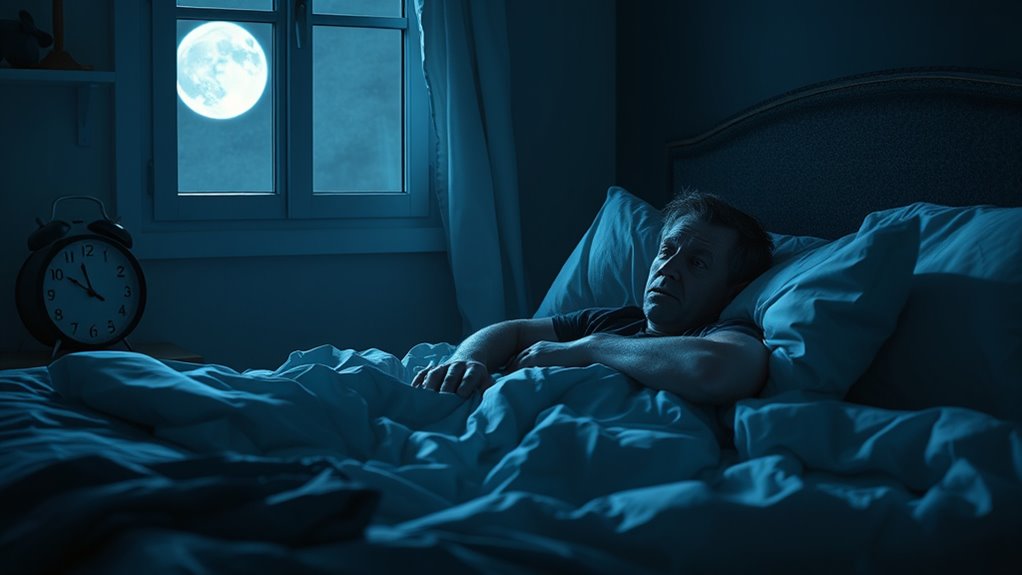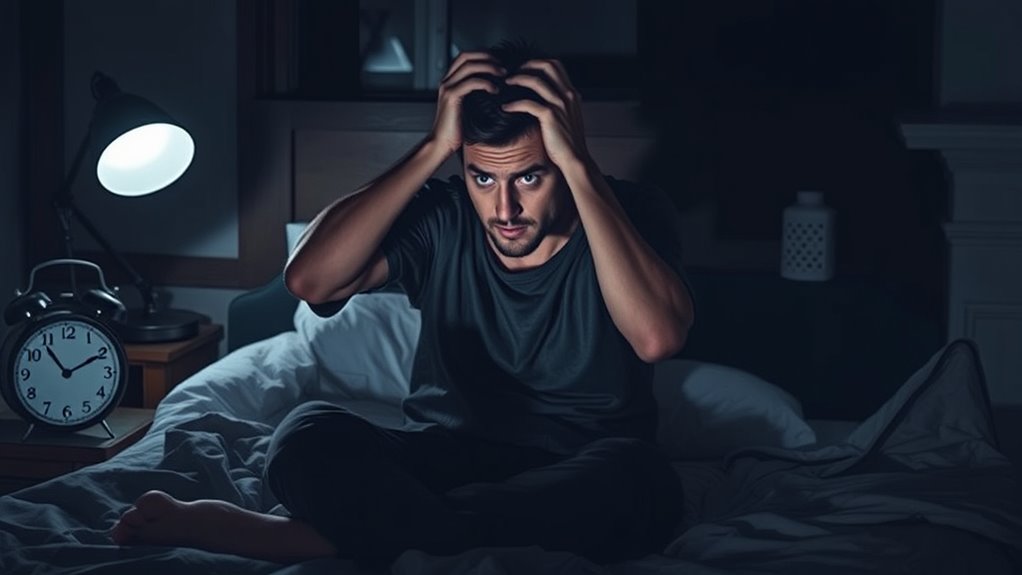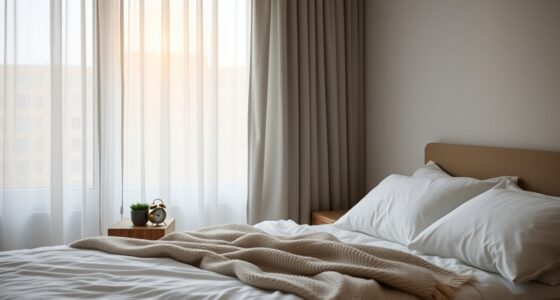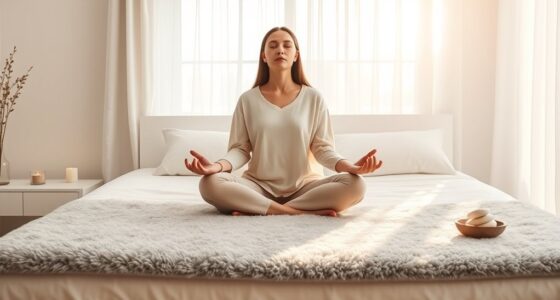Sleep anxiety involves worries and racing thoughts about falling or staying asleep, often accompanied by vivid or unsettling dreams. Insomnia, on the other hand, is characterized by physical sleep difficulties like trouble falling asleep or staying asleep, even if you’re not worried. If your sleep issues arise from mental activity and fear, it’s sleep anxiety. If you struggle despite feeling tired, it’s insomnia. To learn more about recognizing and managing these, keep exploring further.
Key Takeaways
- Sleep anxiety involves persistent worries and racing thoughts about sleep, while insomnia primarily pertains to physical difficulty falling or staying asleep.
- Sleep anxiety often features vivid or unsettling dreams that increase concern, whereas insomnia may occur with minimal mental preoccupation.
- Recognizing sleep anxiety involves noting excessive mental activity and fear of consequences; insomnia can exist without worry.
- Managing sleep anxiety typically requires psychological strategies like CBT and mindfulness, unlike insomnia which may need sleep hygiene adjustments.
- Difficulty falling asleep due to worry indicates sleep anxiety; frequent awakenings without concern suggest insomnia.

Sleep anxiety and insomnia are often confused, but they are distinct issues that can considerably affect your rest. Sleep anxiety involves a persistent worry about falling asleep or staying asleep, often fueled by negative thoughts and fear of consequences like fatigue or poor performance. This anxiety can lead to a cycle where your mind races with concerns, making it even harder to relax once you hit the bed. In contrast, insomnia is a broader sleep disorder characterized by difficulty falling asleep, staying asleep, or waking up too early, regardless of how tired you are. While sleep anxiety often accompanies insomnia, they’re not the same—one is a psychological barrier, and the other is a clinical condition.
Sleep anxiety is persistent worry about sleep, while insomnia is a broader disorder involving difficulty falling or staying asleep.
When dealing with sleep anxiety, you might notice your mind becomes overly active as bedtime approaches. Dream imagery may be vivid or unsettling, contributing to your overall stress about sleep. These intrusive thoughts can distort your perception of rest, making you believe you’ll never get enough sleep. To counteract this, establishing consistent bedtime routines becomes vital. A calming routine—like reading, gentle stretches, or listening to soothing music—can help signal your brain that it’s time to unwind. Avoid screens and stimulating activities close to bedtime, as they can intensify your worries and interfere with your ability to relax. Instead, focus on creating a peaceful environment that fosters tranquility, making it easier to let go of anxious thoughts and drift into sleep.
Recognizing the difference between sleep anxiety and insomnia involves paying attention to your thought patterns and behaviors around sleep. If you find yourself lying awake, consumed by worries about not sleeping, and these thoughts dominate your mind, you’re likely experiencing sleep anxiety. On the other hand, if you’re physically tired yet unable to fall asleep despite feeling ready, or if you wake frequently during the night without significant worry, it’s more indicative of insomnia. While both issues can be managed with strategies like improved bedtime routines, addressing sleep anxiety often requires psychological approaches such as mindfulness or cognitive-behavioral therapy to break the cycle of worry. Understanding how mental activity and sleep hygiene practices influence your sleep can help you develop targeted solutions.
Understanding these differences empowers you to tailor your approach. For sleep anxiety, calming your mind and reducing mental agitation is essential. For insomnia, improving sleep habits and seeking medical advice if necessary can help restore your sleep patterns. Recognizing how dream imagery and mental activity play into your sleep struggles allows you to take targeted steps towards restful nights. Whether it’s adjusting your routines or seeking professional help, knowing what’s behind your sleep difficulties is the first step toward better rest.
Frequently Asked Questions
Can Sleep Anxiety Lead to Long-Term Insomnia?
Yes, sleep anxiety can lead to long-term insomnia. When you worry about falling asleep, it creates a cycle of heightened arousal that makes sleep difficult. To break this cycle, you can try relaxation techniques like deep breathing or progressive muscle relaxation. Cognitive therapy also helps by addressing negative thoughts about sleep, reducing anxiety, and promoting healthier sleep patterns over time. Consistent practice is key to overcoming chronic sleep issues.
Are There Specific Triggers for Sleep Anxiety?
Sleep struggles often stem from specific stressors, such as stressful situations, fears, or unsettling thoughts. You might notice triggers like daytime stress, which fuels fear of sleepless nights. To combat this, try relaxation techniques like deep breathing or meditation. Recognizing these triggers helps you tame tension, transform worry into calm, and tackle sleep anxiety head-on, easing your mind and encouraging peaceful, restful nights.
How Can I Differentiate Between Occasional Sleep Trouble and Chronic Insomnia?
You can tell if your sleep trouble is occasional or chronic by observing if it persists for more than three weeks. If you notice frequent sleep pattern changes, difficulty falling asleep, or waking up feeling unrefreshed, it’s likely insomnia. Be cautious of medication dependence, which can worsen sleep issues over time. If your sleep problems are ongoing, consult a healthcare professional to prevent them from becoming a long-term issue.
Do Sleep Aids Help With Sleep Anxiety?
Imagine your mind as a restless ocean, waves crashing with worry. Sleep aids can help calm this storm temporarily, but they often don’t address sleep anxiety directly. While medication effects may ease initial tension, combining sleep aids with relaxation techniques like deep breathing or meditation offers better relief. Use them as part of a broader approach, rather than relying solely on sleep aids to quiet your racing mind.
Is Sleep Hygiene Effective for Both Sleep Anxiety and Insomnia?
Yes, sleep hygiene and routines are effective for both sleep anxiety and insomnia. When you prioritize consistent sleep habits, like going to bed and waking up at the same time, and create a calming environment, you reduce anxiety and improve your sleep quality. Sleep hygiene helps break negative patterns, making it easier to fall asleep and stay asleep, whether you’re dealing with anxiety or insomnia.
Conclusion
So, now you know the difference between sleep anxiety and insomnia. Ironically, the more you worry about falling asleep, the harder it gets—kind of like a sleep paradox. Instead of stressing over your sleep issues, try relaxing and trusting your body. After all, losing sleep over losing sleep only keeps you awake longer. Maybe the best way to finally rest is to stop overthinking it and let sleep find you naturally.









